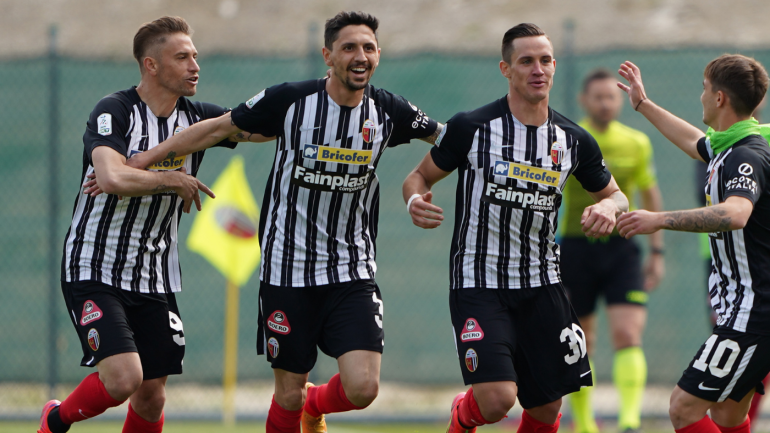
It can on occasion feel like scarcely a week goes by without a U.S. investor securing for themselves an Italian football club. From giants of calcio such as Fiorentina and Roma to comparative minnows Catania and Pisa, the influx of cash from across the Atlantic seems relentless.
The logic is clear. For the most part these are assets that are available for the fraction of the cost of a U.S. sports franchise, that have perhaps not always been run with a clear eye on the financials, leaving new revenue streams to exploit and who, thanks to the rich history of the sport in Italy, often have a reach far beyond their town or city.
"It's a perfect model, really, for private equity, because private equity goes in, and they look at undervalued assets that in some cases are mismanaged," says Matt Rizzetta, whose North Sixth Group acquired a stake in Ascoli, Italy's fourth-oldest professional club, last week alongside DIY magnate Massimo Pulcinelli. "Italian football clubs historically fit that model perfectly. There are six or seven streams of revenue that the clubs potentially can generate and I would bet, on a good day in a good club, you're lucky if two or three of those revenue channels are being leveraged properly. So when you look at it from an investment standpoint, you can go in and turn one of those clubs into an incredibly profitable, successful platform."
But for Rizzetta the appeal of owning Ascoli -- in addition to the Serie C club Campobasso that he acquired last year -- is hardly about maximiszng his investment. Whilst that of course matters and whilst the new owners have grand plans for I Picchi (The Woodpeckers), the New York-based businessman has more personal reasons for involving himself in calcio.
When Rizzetta was a small child his parents and sister were involved in a car accident that left his mother in a coma, his father suffering terrible injuries and his sister with an epileptic seizure disorder. For several years raising Matt was the responsibility of his grandparents, emigrants to the USA in their 30s and the individuals who Rizzetta says his whole career has been a tribute to. The name of his firm comes from the street in Mount Vernon, New York, that his grandparents emigrated to and it is from them that his love of soccer developed.
"I can still remember it so lucidly, you know," he recalled. "Sunday mornings were spent at my grandparents house with a house with espresso in the kitchen and football on the TV in the living room. That's just kind of how I grew up."
It was the era of the all-conquering AC Milan and the divine ponytail Roberto Baggio, the player who most enchanted Rizzetta. And during that time Ascoli were yo-yoing up and down the Italian football pyramid, a regular fixture in the middle and lower reaches of Serie A or the top of Serie B. One of the grand old institutions of Italian football, the likes of Oliver Bierhoff, Benito Carbone and Ricardo Orsolini made their way through The Marche in their football career.
Craving even more coverage of the world's game? Listen below and follow ¡Qué Golazo! A Daily CBS Soccer Podcast where we take you beyond the pitch and around the globe for commentary, previews, recaps and more.
Rizzetta is optimistic that a partnership with Pulcinelli -- whose Bricofer company is the largest home goods retailer in Italy -- will offer complimentary skillsets that can forge a serious force in Italian football. He has some cause for optimism in his own ability to have success in this country; Campobasso were promoted to Serie C in their first season under his ownership.
Asked which clubs he looks to as a model for what Ascoli might achieve, he points to last season's third-place side: "Atalanta grew from a provincial club that was kind of oscillating between Serie A and Serie B for decades, and now they're one of the elite clubs in Europe. I mean, it's incredible.
"They have a business model that is sustainable, it's built on nurturing youth talent, having them contribute at the top of the table and then optimizing their values and then selling them potentially to larger clubs but always having a youth system of players that can fill the pipeline. In every respect Atalanta is an incredible model. They're a model for business sustainability. In a time where most of the top clubs in the world are losing money Atalanta has competed pound for pound with the top clubs in the world and they're actually running a profitable, sustainable business.
"And they've done it the right way: respecting their tradition, connecting with their fans, building an incredibly passionate following in northern Italy."
To build a footballing powerhouse such as Atalanta whilst expanding the brand internationally, maintaining a community connection and living sustainably is no easy task for Ascoli. In particular melding a global brand with an appreciation of 123 years of local history is an almighty challenge and one that other clubs have not always successfully negotiated. One needs only to look back to the creative misstep that was Juventus ditching their black and white striped kits for the 2019-20 season because they worried Americans would view them as referee uniforms. By 2020-21 the traditional look of the Bianconeri, one shared with Ascoli, was back.
Rizzetta insists that under his watch the look of the club will never change in such a radical fashion. He does, however, see space for innovation with, for instance, one-off jerseys that can be worn in 'derbies' against the other Serie B sides with American owners. Ascoli are also partnering with content creators IFTV and on Saturday's part of their New York City office will become an Ascoli fan park, screening the weekend's game as they try to build a brand beyond central Italy. Yet there are emotional foundations at the Stadio Cino e Lillo Del Duca that will remain stable.

"I think the big challenge is always really understanding the culture," Rizzetta says. "If you go in with an overly Americanized mindset where you just try to run an American sports franchise playbook -- for these Italian football clubs it's a recipe for disaster. I mean, you really need to connect with the fans, you need to understand the tradition, you need to understand all the nuances and layers of the local culture and what makes the clubs tick.
"Ultimately, these clubs really are community-run clubs that are embedded in the fabric of the local cities. If you don't have, you know, if you don't have high emotional intelligence and an ability to really understand that, as an owner, your project will never get off the ground."
It helps then that it is very easy to talk to Ascoli's new owner and see how he can bond with football fans. He is one, after all. There may be a plan for success on and off the field but you sense that for Rizzetta this project has never really been about asset value, brand development and winning trophies.
"My grandfather passed away almost 18 years ago. He was a much smarter person than I than I'll ever be. He just didn't have the resources. He left Italy at 30 years old, he never spoke English, his career was already sort of in flight at the time he left. If my grandfather would have had the resources I had, he would have achieved much, much more in his career than I've ever achieved in mine. So you know, in some small way, I hope he's looking down and just saying all the sacrifices that he made in the end were worth it. I don't think I needed to buy an Italian football club to show that to him. But I think this is just one way of doing so.
"Every Saturday is literally like I'm reliving my childhood. To have somebody who was so close to me, who has gone for 18 years now, now I literally feel like I'm next to that person every Saturday. I mean, there's no amount of money you can pay for that type of experience. This is probably the only investment I could have ever made that would bring that those memories back and bring that experience to me."
![[object Object] Logo](https://sportshub.cbsistatic.com/i/2020/04/22/e9ceb731-8b3f-4c60-98fe-090ab66a2997/screen-shot-2020-04-22-at-11-04-56-am.png)

















